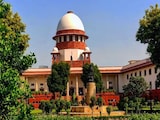Volodymyr Umanets, a 69-year-old security guard, hopes his son will be among the Ukrainian prisoners of war now being handed over by Russia, but he knows he could be part of a more sombre homecoming: the repatriated remains of dead soldiers.
Not knowing which group his son, Mr Sergiy, will be in is a torment. "I am told to wait. What else is left for me to do?" said Mr Umanets, as tears welled up in his eyes.
This week Russia and Ukraine began implementing a deal reached at June 2 peace talks in Istanbul to hand over 1,000 prisoners of war each, and also a huge number of human remains.
Alongside the joyful scenes of soldiers returning home and hugging loved ones, there have been macabre images of men dressed in hazmat suits transferring body bags from refrigerated trucks.
Russia said it plans to hand over the remains of around 6,000 Ukrainian soldiers in this phase of the exchange. So far this week, it said it transferred 1,212 sets of remains, while Ukraine said it handed over the bodies of 27 Russian soldiers.
Volodymyr Umanets's son Mr Sergiy, 49, served in the army as a younger man and volunteered to rejoin shortly after the February 2022 full-scale invasion. He was serving in the Ukrainian military in south-eastern Ukraine when he went missing in combat in December 2023.
His father, who works as a security guard in the town hall in Bucha, outside Kyiv, said he still hopes Sergiy is alive, and that he was captured by the Russian side.
But he acknowledged the possibility that his son may have been killed. He gave authorities a sample of his DNA so that if Sergiy's remains are recovered, he can be identified.
"You know, I want to know at least something, to get at least some information," he said.
"I read recently in the newspaper that a young man was declared missing. And during the exchange of bodies, his DNA was identified. He was buried today. I wish I knew at least this."
Each side has been handing over soldiers' remains periodically throughout the conflict, but the swap now underway is of an unprecedented scale.
PAINSTAKING PROCESS
For Ukraine, the repatriation of the remains marks the start of a long and painstaking process to identify who they are, how they died, and to notify their families.
The task is made more complicated because sometimes the returned soldiers were killed in explosions so their bodies are in fragments, according to Djordje Alempijevic, a professor of forensic science at Belgrade University who helped examine the remains of people killed in conflicts in the Western Balkans in the 1990s.
An added complication, he said, is that some of the remains have been stored for a long time, and they degrade, even if kept in refrigeration.
In the best case scenario, the bodies are returned with some documents to help identification, said Dmytro Hapchenko, a local council official in Bucha who has worked on remains of people killed in the war.
But he said that does not always happen.
In fact, Ukraine has alleged that Russia's approach to processing the remains of Ukrainian soldiers has been haphazard.
On June 2, Ukrainian President Volodymyr Zelenskiy told reporters that in previous repatriations of remains, Russia handed over bodies to Ukraine that were actually dead Russian soldiers.
Russia, in response, has accused Ukraine of deliberately delaying the exchange of the remains, stranding trucks with human bodies on the Russian side of the border, a claim denied by Ukraine.
Absent any identifying documents for the returned remains, forensic pathologists will try to conduct an autopsy, said Mr Alempijevic. He said they look for features like old bone fractures, dental characteristics, and metal plates or screws from old surgeries.
Mr Alempijevic, member of the UN Subcommittee for the Prevention of Torture, said autopsies also allowed pathologists to look for evidence of a war crime.
Ukrainian prosecutors have alleged some Ukrainian soldiers were tortured in captivity, or summarily executed, and they are preparing criminal prosecutions. Russia has denied those allegations.
Hapchenko, the Bucha city official, said he was supporting families from his area whose loved ones went missing in the fighting.
"Unfortunately, there are quite a few of them," he said. Referring to the repatriation of fallen soldiers now underway, he said: "Maybe now they'll be able to bury them."
(Except for the headline, this story has not been edited by NDTV staff and is published from a syndicated feed.)















